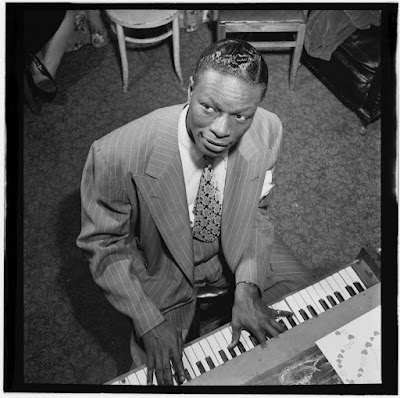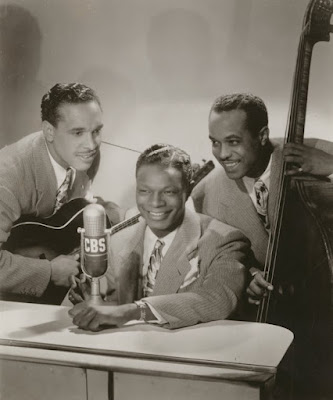The lyrics to Nature Boy are brief, about an unusual boy who reveals, “The greatest thing you’ll ever learn is just to love, and be loved in return.” ‘Wow,’ I thought, ‘Those lyrics are very new age and hippie for a jazz song.’ What is the story behind this quirky song with a wistful melody? It turns out the story and artist behind the song are fascinating, and perhaps worthy of a feature film.
Who Is Nature Boy?
McGrew moved to Los Angeles, California in the early 1940s and played music at a health food store owned by German immigrants who were part of the Wandervogel movement in Germany. The followers of this German back-to-nature movement were known as Nature Boys. It was around this time that McGrew changed his name to eden ahbez, not capitalizing the names as he believed only God and Infinity were worthy of this honor.
In 1947, ahbez gave the lyrics of "Nature Boy" to musician Nat King Cole’s manager and Cole began performing the song to audiences regularly and to great acclaim. Before Cole could release the song on record, ahbez had to be tracked down so that proper rights could be attributed and paid. Allegedly, ahbez was found living underneath the Hollywood sign, under the first 'L'.
Nature Boy is a Hit
"Nature Boy" went on to be a hit for Nat King Cole in 1948 and stayed at #1 on the Billboard charts for eight weeks. The success of the song made ahbez into a temporary celebrity who was featured in articles in Life, Time, and Newsweek magazines. There is a 1948 television clip of ahbez on YouTube that shows the long-haired and bearded songwriter coming on stage with a bicycle and sitting cross-legged on the floor for his interview. Clearly, eden ahbez was a man who lived life on his own terms and without a publicist.
But the story doesn’t end there. It turns out the melody for "Nature Boy" was perhaps in part taken from a Yiddish song called “Shvag, Mayn Hartz” (Hush, My Heart). Ahbez later settled out of court with song owner Herman Yablokoff for $25,000. Also, the first two measures of Nature Boy are taken from Antonin Dvorak’s Piano Quintet No. 2 in A, Op. 81 (1887).
Why is "Nature Boy" so popular and resonating as a song even today? Maybe it’s because the older melodies in "Nature Boy" are planted in our collective unconscious; a classical tune and a folk tune are cobbled together to create something new that sounds old. The contemporary lyrics cement the song as successful. The emotional payoff of the song is that we don’t have to cure cancer, leap tall buildings, or find a clean and perpetual energy source. We don’t have to find peace in the Middle East or find the Grand Unification Theory of the universe. We merely have to love and be loved to live life successfully. A simple and satisfying message is conveyed to us in a song sung by a child. Sigh.
"Nature Boy" — the song based on German hippies, classical music, and a Hebrew melody — goes on to be recorded by musicians such as Natalie Cole, James Brown, John Coltrane, Miles Davis, Marvin Gaye, Engelbert Humperdinck, Aaron Neville, Sarah Vaughan, David Bowie, Celine Dion, Sun Ra, Frank Sinatra, Peggy Lee, and many others.
A final note about a possible influence: It should be noted that the French writer Amantine Lucile Aurore Dupin (1804-1876), also known as George Sand, has a quote: "There is only one happiness in life, to love and be loved." Perhaps this is another inspiration for eden ahbez' great jazz standard song, "Nature Boy"?
The Birth Certificate of Eden Ahbe, George Alexander Aberle
Consider this a sidebar to the previous article.
I became so interested in American musician Eden Ahbez that I requested a copy of his birth certificate from New York. I also enjoy doing research using original documents. It was fun to see this document with George crossed out and Eden Ahbe at the top. It is an administrative declaration of independence. The birth certificate of eden ahbez, also known as Ahbe, George Alexander Aberle, and George McGrew, reveals a few tidbits about this unique American’s early life.
Parents of Eden Ahbe
Parents of Eden Ahbe
George Alexander Aberle was born on April 15, 1908, to George Philip Aberle (bookbinder) and Mary Ann Mason Aberle of 263 Nassau Street in Brooklyn, New York. Eden’s father is listed as born in New York, while his mother’s birthplace is England. Mary Ann Aberle is 34, while George Aberle is 37.
At the top of the birth certificate, the name of George Alexander Aberle is crossed out and Eden Ahbe is written, in block letters. (No, there is no ‘Z’.) It looks like the name change was approved by the court on November 17, 1943, and approved by the Commissioner of Health on March 8, 1951.
The Aberle Family
At the top of the birth certificate, the name of George Alexander Aberle is crossed out and Eden Ahbe is written, in block letters. (No, there is no ‘Z’.) It looks like the name change was approved by the court on November 17, 1943, and approved by the Commissioner of Health on March 8, 1951.
The Aberle Family
In researching the origins of eden ahbez, I looked up his dad George Philip Aberle in the 1910 US Census. The Aberle family lives in Brooklyn Ward 11, Kings, New York. The older Mr. Aberle lists his father and mother as being born in Germany. Eden’s mom is named Margaret (she is listed as Annie in other census reports) and the children living in the house are: Elizabeth C. (age 16), Grace G. (age 13), Walter P. (age 11), Irene L. (age 9), William L. (age 8), Edna M. (age 6), Lester P. (age 4), Anna M. (age 3), Adatha B. (age 2), and then there is George A. Aberle, age 2. On seeing the two kids the same age one wonders if George and Adatha were twins, though perhaps they were just born in the same year.
Perhaps the most significant detail here is that the young George Alexander Aberle is the tenth child to be born to his mother. Maybe George goes to Kansas to be raised by the McGrew family because there are too many kids for the parents to care for.
And what caused George Alexander Aberle to change his name to Eden Ahbez formally? Was there a psychological disconnect from his biological family of origin, or was ahbez merely practicing the fine art of reinventing himself? Was George inspired to choose the name 'eden' from his sister named Edna? Sadly, we may never know. What we do know is that Eden gave us one amazing song that is beloved by many all over the planet.
Perhaps the most significant detail here is that the young George Alexander Aberle is the tenth child to be born to his mother. Maybe George goes to Kansas to be raised by the McGrew family because there are too many kids for the parents to care for.
And what caused George Alexander Aberle to change his name to Eden Ahbez formally? Was there a psychological disconnect from his biological family of origin, or was ahbez merely practicing the fine art of reinventing himself? Was George inspired to choose the name 'eden' from his sister named Edna? Sadly, we may never know. What we do know is that Eden gave us one amazing song that is beloved by many all over the planet.


